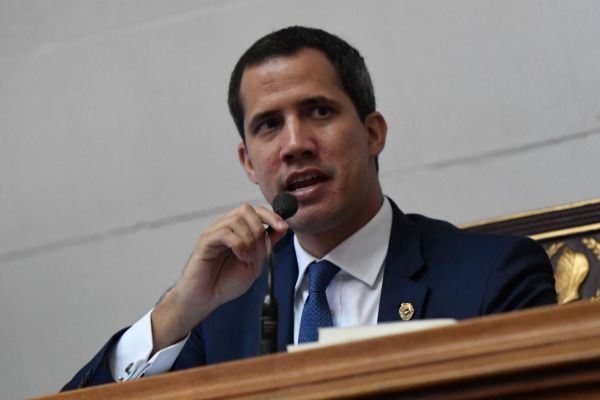- Report: Venezuelan hospitals without medicines, electricity or water
The path for the use of foreign military force against Nicolás Maduro has opened today in the session of the Permanent Council of the Organization of American States (OAS), when most of the countries that are part of the Inter-American Treaty of Reciprocal Assistance (TIAR) ), approved the convening of the consultation body of that mechanism in search of its activation.
That consultation body, composed of the foreign ministers of the countries that subscribe the TIAR, will meet at the next United Nations General Assembly in New York, to define whether the mechanism is applied, which provides for mutual defense between the signatory nations against attacks armed . The foreign ministers must address the magnitude of the threat that the Maduro regime represents for the region.
"With the convening of the TIAR consultation body, a new phase of pressure against the dictatorship of Nicolás Maduro opens, the region recognizes that this regime is a threat to the peace, security and stability of the region," Julio Borges wrote on Twitter, Chancellor of Guaidó.
Borges said that the convening of the consultation body was achieved thanks to the work of the National Assembly, controlled by the opposition, the special representative of Venezuela before the OAS, Gustavo Tarre, and the democratic leaders who have fought to "get out of the dictatorship ".
The vote was left with 12 votes in favor of the convening of the body , supported by Venezuela, Argentina, Brazil, Chile, Colombia, El Salvador, USA, Guatemala, Haiti, Honduras, Paraguay and the Dominican Republic. There were five abstentions and one absent .
" The fundamental thing is to stop the suffering of the people and this treaty gives the necessary scaffolding to adopt measures," said Carlos Vecchio, ambassador to the United States parliamentary chief of Venezuela, Juan Guaidó, recognized as president in charge of more than 50 nations.
Vecchio said that the TIAR is an instrument that can be used when the peace of the continent exists or is at risk. "I think the Venezuelan crisis demands it," he said.
The convening of the consultation body does not automatically imply a military intervention , as the foreign ministers will decide whether the TIAR will be applied and what will be the appropriate measures in the case of Venezuela, as the mechanism also contemplates other more subtle options, such as the rupture of diplomatic relations or economic sanctions.
A negotiated exit
The Treaty of Rio, an insistent request from radical opponents, was questioned for its fragility during the Falklands War. Both the United States and the European Union (EU) and the countries that make up the Lima Group have clearly opted for a negotiated exit to the Venezuelan collapse.
Most of the member countries of the TIAR rejected a proposal from Costa Rica, Peru and Chile, which asked to exclude the possible use of force in the case of Venezuela.
Mexico, for its part, opposed the invocation of the treaty, although not part of it, arguing that it is contrary to the interests of the OAS, which promotes peace. The delegation of Bolivia, one of Maduro's main allies, withdrew from the discussion in protest, although that country is not part of the mechanism either.
Prior to the convening of the TIAR consultation body, Colombian Foreign Minister Carlos Holmes presented evidence of how Venezuelan authorities have established links with terrorist organizations such as the guerrillas of the former Revolutionary Armed Forces of Colombia (FARC), of the National Liberation Army (ELN) and with the new dissident groups of the FARC, led by Iván Márquez.
"That is a risk to the national security of Colombia. An ELN in Venezuelan territory with regime protection, generates an element against the peace of the region. Residual groups of the FARC, which are linked to the Venezuelan authorities, carry out activities of social control in Venezuela, train militias and charge at border crossings. The Sebin - the Venezuelan Intelligence Service - protects these groups, "Holmes said.
The representative of Venezuela before the OAS, Gustavo Tarre, affirmed that the Maduro regime constitutes a threat to the continent due to various factors, one of them for stimulating the migration of almost five million Venezuelans to different countries, which in his opinion generates "a factor of political, economic and social destabilization for the nations that receive them"
"It is easy to give statements that one must negotiate and dialogue, but in reality the regime does not want to negotiate or dialogue . We are open to any solution to get out of the oprobious, corrupt and murderous regime," Tarre added.
According to the criteria of The Trust Project
Know more- Venezuela
- FARC
- Colombia
- Nicolás Maduro
- Chile
- U.S
- European Union
- Mexico
- Argentina
- Brazil
- Juan Guaidó
- Peru
- Latin America
- Venezuela Elections
Venezuela Nicolas Maduro threatens Colombia with missiles and military exercises
VenezuelaThe Prosecutor's Office supports the extradition of Chavista Hugo 'el Pollo' Carvajal to the United States
VenezuelaThe Nicolás Maduro regime disables Borges, Ledezma and prosecutor Ortega for 15 years

